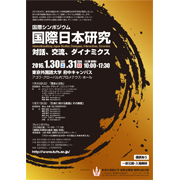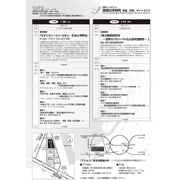International symposium Internationalizing Japan Studies: Dialogues, Interactions, Dynamics
10:00-17:30, 30th&31st January 2016
| Date/Time | Sat. 30th January, Sun. 31st January, 2016 10:00~17:30 |
|---|---|
| Venue |
Prometheus Hall in AGORA Global on Fuchu Campus,
Tokyo University of Foreign Studies (Fuchu Campus) Access |
| Admission | Free,No pre-registration needed |
| Languages | Japanese, English |
| Pre-Symposium Workshop |
Assembly for Japan Studies in Japan
Fri. 29th January 14:00~17:00 “Past, Present, Future of Internationalizing Japan Studies” Keynote Address: Kazuhiko Komatsu (International Research Center for Japanese Studies) “Japanology in the Age of Globalization: the Present and Future” Academic remarks on Japan have significantly been changing since we entered the twenty-first century. The conventional research viewpoint focusing on the economic success of Japan and exploring the historical and social background that brought that success has fallen by the wayside. Instead, interests are now gathering around the popular culture of Japan, such as animation and comic books, which are expanding globally. In this presentation, we will consider the role of the International Research Center for Japanese Studies by exploring the direction and methodology of Japanese Studies while reviewing some unique business achievements of the Center, including Yokai and Shunga. |
| Effect | In April 2015, Tokyo University of Foreign Studies (TUFS) established the Graduate School of Japanese Studies. This international symposium is being held in conjunction with the Graduate School’s launch. It seeks to consider the past achievements, current state, and future trajectory of Japanese Studies around the world. A reflection of the multi-disciplinary nature of Japanese Studies, the symposium brings together scholars from various disciplinary backgrounds, including cultural studies, history, Japanese linguistics, and Japanese language education. |
| Theme and Lecturers |
Sat. 30th January “History and Culture”
Keynote Address:Carol Gluck (Columbia University) “Modernity in Common: Japan and World History” summary: This lecture is based on the dual assumption that just as one cannot tell the modern history of any society in isolation from the world, the history of the modern world can in fact be grasped from the vantage point of any place on the globe. In this instance, the place is Japan. One of a “globeful of modernities,” Japan shares commonalities and connections with other modern societies. At the same time it offers the opportunity to develop ideas about the “modern” based on empirical evidence different from the European experiences that underlay earlier theories of modernity. Here I examine four questions frequently asked about modern Japanese history, from the nineteenth century until the present, in order to see how they appear when viewed in a global context -- in the context of “modernity in common.” Speakers: ・Christpher Gerties (University of London, SOAS) “Angry, Young and Mobile: Blue-collar Youth and Radical Politics in Postwar Japan” ・Daivd Hughes (University of London, SOAS) “Excavate, Preserve, Develop, Fuse, Intervene: The activities and impact of the Nihon Min'yō Kyōkai (Japan Folk Song Association)” ・Iris Haukamp (University of London, SOAS) “Itami Mansaku, contested histories, and editorial interventions: cinema and our understanding of the past” ・Ethan Marks (Leiden University) “Japan and WWII as Global History” ・Kyoko Nomoto (TUFS) “The Magnetic Field of Historical Studies with Agrarianism as a Clue” ・Rie Suganaga (TUFS) “Prospects for HAIKU: The Basho, Torahiko, and Matsuyama Declaration” Sun. 31st January "Japanese Linguistics and Education of Japanese as Language" Keynote Address: Taro Kageyama (National Institute for Japanese Language and Linguistics [NINJAL]) “The National Institute for Japanese Language and Linguistics: Globalization and Japanese Language Studies” Summary: The theoretical study of language originated in the West, and there was a time when accepting those theories was regarded as internationalization. However, the academic world of linguistics today is directing its focus toward non-European languages, particularly progressive theoretical studies in Japanese. In tomorrow's world, where the contrasting concepts of globalization (world unification) and diversity (individuality) must attain harmony, what is the direction that Japanese language studies should take? Here we will present a brief introduction to the initiatives of the National Institute for Japanese Language and Linguistics. Speakers: ・Hisashi Noda(NINJAL) “Japanese Language Studies by the National Institute for Japanese Language and Linguistics:Focusing on Grammar for Comprehension by Japanese Language Learners” ・Nobuko Kibe(NINJAL) “Diversity of Japanese Dialects: Differences in Regional Accents” ・Anna Bugaeva(NINJAL) "Toward New Horizons in Ainu Studies: Research Activities of the NINJAL-based Ainu Reseach Group" ・Yoshiyuki Asahi (NINJAL) “Variation Studies and Japanese Language Variation and Change” ・Futoshi Kawamura(TUFS) “Classical Language Education in International Japan Studies” ・Tomoko Fujimura(TUFS) “Japanese Language Learning and e-Learning” |
| Organizer | Institute of Japan Studies, Tokyo University of Foreign Studies |
| Joint sponsorship |
International Center for Japanese Studies,
Tokyo University of Foreign Studies |
| Supporter | The Society for Teaching Japanese as a Foreign Language |
| Contact |
Office for International Affairs, Tokyo University of Foreign Studies,
3-11-1, Asahi-cho, Fuchu-shi, Tokyo 183-8534, Japan TEL:042-330-5534 E-mail: TUFS-sympo2015-admin[at]tufs.ac.jp *Please replace [at] with @ |
|
Poster(Japanese)
/
Program(Japanese)
|
|


